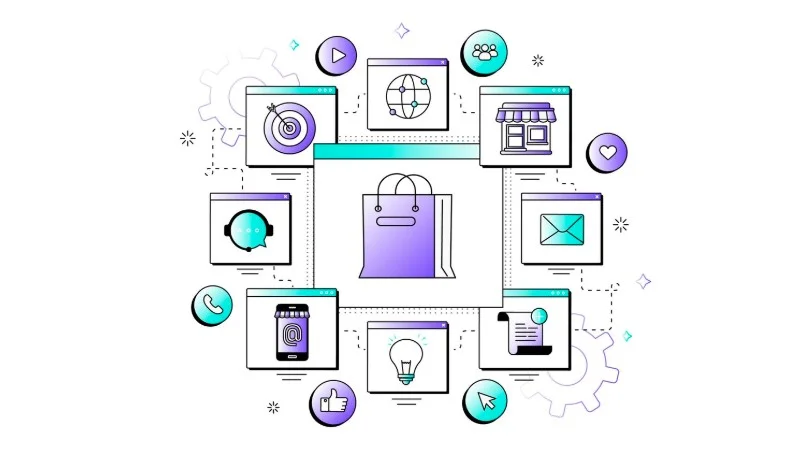B2B business is changing continuously. With rising customer expectations, product portfolio extensions, omnichannel requirements, and global supply chains, B2B organizations have to deliver experiences exclusively for B2C consumers prior to—fast, context-aware, and frictionless. Historically e-commerce platforms and legacy ones are no longer adequate. Contemporary B2B organizations require robust, nimble, and resilient platforms so that they are able to bridge the gap with evolving needs and demands.
Enter Adobe Commerce, previously Magento Commerce. Designed to tackle intricate business models, Adobe Commerce is helping B2B brands thrive in a growing digital, intensely competitive landscape. From one-to-one shopping experiences through advanced pricing engines and multi-organization administration, Adobe Commerce is made to deliver B2B success.
This piece of writing describes how businesses can tailor Adobe Commerce solution development to their particular B2B commerce requirements and why it is so crucial to find the right technology partner.
The Unique Challenges of B2B ECommerce
While B2C commerce has shorter sales cycles, high volume, negotiated prices, and configured product customization, B2B commerce has longer sales cycles, high volume, negotiated prices, and configured product customization. Buyers sometimes need to utilize credit lines, account-based pricing, tiered rights of access, and integration with procurement systems. This complexity underscores the critical importance of robust b2b ecommerce website development, which must seamlessly handle the added burden of multi-channel, multi-region, and multi-language demands—challenges amplified exponentially in global operations.
Let’s mention a few most favorite challenges of B2B Ecommerce:
- Sophisticated pricing and quote processes: Customers need bespoke quotes, prices, and approvals.
- Account-based experiences: Customers need differential permissions depending on business roles.
- Inventory and catalog sophistication: Customers need tens of thousands of SKUs, technical product information, and multiple inventories.
- Integration requirements: ERP, CRM, and PIM system integrations without bother for data purity.
- Scalability and performance: As transactions and product catalogs rise, system capability and reliability follow suit.
B2B companies that neglect these aspects risk getting left behind. However, organizations embracing tailored digital solutions induce operating efficiencies, enhanced customer interaction, and increased conversion rates. This is especially important when working with vendors and supplier, where streamlined processes and clear communication can make a significant difference.
Why Adobe Commerce is Perfect for B2B
Adobe Commerce provides an out-of-box enterprise-ready platform with the entire set of B2B features. Your business can run on direct B2B email list, B2B2C, or hybrid business models, and Adobe Commerce provides features of scalability, performance, and customizability.
Enterprise features are:
1. Company Accounts & Role Management
B2B customers mostly need groups of users with the same access to one account. Adobe Commerce accommodates company accounts with multi-level permissions and roles, which improves workflow and user management.
2. Custom Catalogs & Pricing
Adobe Commerce enables companies to assign custom price lists and catalogs to individual customers by account, geography, or contract. This is simple to provide customized shopping experiences for each buyer.
3. Quote for Request (RFQ) Support
Quote for bulk quantities or bespoke products can be supported by buyers. Quote can be negotiated, approvals can be managed, and quote-to-order automated—all from out-of-the-box, within the platform.
4. PunchOut & Procurement Integration
Adobe Commerce is PunchOut catalog compatible and can easily be configured compatible with procurement tools such as SAP Ariba or Oracle so that large businesses can order directly from internal platforms.
5. Unified APIs
Both REST and GraphQL APIs would be accessible since Adobe Commerce makes integration with ERP, CRM, PIM, or warehouse management software easy to bring order across systems.
6. More Reporting and Analytics
There are live dashboards that allow firms to track performance, sales, and customer behavior and offer actionable insights towards ongoing improvement.
One of the greatest advantages of Adobe Commerce is that it can be super flexible. Any B2B company has a slightly different flow and customer need—whether a parts manufacturer producing one-off parts or a distributor shipping to lots of regional wholesalers. This adaptability is particularly important in ecommerce for manufacturers, where ordering logic, pricing structures, and customer relationships rarely follow a one-size-fits-all model. Adobe Commerce can adapt to them.
This is where the expertise of a seasoned Adobe Commerce development company can be useful. A seasoned team will sit down with you, hear your business’s specific issues, existing tech stack, and growth plan and then craft a solution that is right for you.
This is how customization would actually operate in the world:
- Manufacturing: CAD file integration, product configurators, and complex BOM structures.
- Wholesale Distribution: Real-time in-house warehouse quantities, batch order forms, and negotiated price catalogs.
- Automotive: VIN search, vehicle-fit, and extended part-compatibility filtering.
- Healthcare: HIPAA-compliant portals, role-based access to patient information, and laboratory system integration.
Regardless of how grand the customer enterprise portal you envision—highly complex, multi-vendor installation or headless commerce deployment—Adobe Commerce can be molded into your dream.
Development Partner’s Role
Adobe Commerce provides the platform—but successful implementation, integration, and ongoing tuning make a difference. The choice of development partner ensures your Adobe Commerce solution has a successful launch and evolves with your business.
An Adobe commerce development services partner enables B2B companies to:
- Customize workflow and user experience
- Design scalable and secure architecture
- Offer seamless third-party integrations
- Optimize for speed and availability
- Develop modules or plugins from business logic
- Integrate test and data migration plans
- Support and maintenance on an as-needed basis
Identify Adobe-certified partners with experience in successful B2B projects and knowledge of digital commerce environments.
Streamlining Operations Through Integration
B2B business today is more than mere front-end customer interaction—back-end processes for ultimate optimization are just as crucial. Adobe Commerce integrates into enterprise infrastructure effortlessly to offer automation and consistency departmentally. Partnering with a trusted Dynamics 365 partner can further enhance system connectivity and ensure seamless data flow across all business operations.
Some of the most important integrations are:
- ERP (SAP, Microsoft Dynamics): Auto-order, price, and inventory information.
- CRM (Salesforce): Synchronize customer data and auto-sales workflows.
- PIM (e.g., Akeneo): Mass scale product data management for marketplaces.
- Payment Processing & Gateways: Local compliance and convenient payment.
- Logistics & Shipping: Auto-fulfill, trackability, and return.
A hybrid system eliminates human error, automates order fulfillment, and offers customers real-time, accurate information—keeping them happy and loyal. Using dispatch software ensures that deliveries are efficiently managed and accurately tracked from start to finish.
Long-Term Growth Scalable Solutions
One of the most important factors in selecting an eCommerce platform is scalability. B2B companies grow, for instance, by diversifying their products, expanding geographically, and by merging. Adobe Commerce scales—whether it’s adding new SKUs and hundreds of users or growing into new geos and new storefronts.
Adobe Commerce grows with your business through cloud hosting, modular architecture, and microservices. With the correct partner, move your tech stack without costly replatforming.
Adobe commerce solution development partners aren’t around today. They’re there in the future. They don’t simply give them a platform that works—they make it future-proof. That is, they code to be extended, document as they go along, and employ agile frameworks to iteratively extend customer and marketplace feedback.
Conclusion
B2B and digital economy demand platforms that can support complex workflows, integrations, and customer and user needs. Adobe Commerce is leading this revolution and provides business organizations with the scalability, reliability, and flexibility they require to innovate in competitive economies.
But technology is only part of the equation. The success of B2B eCommerce is how you implement that technology to facilitate your business model. And for doing that, selecting the best Adobe Commerce development solutions partner is paramount.
With adoption success, your business can automate commerce, deliver personalized experiences, and establish a platform for robust digital growth. B2B is changing, and so should your commerce strategy—and Adobe Commerce can assist you in staying in front of the revolution.



